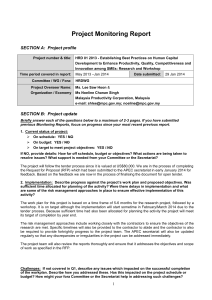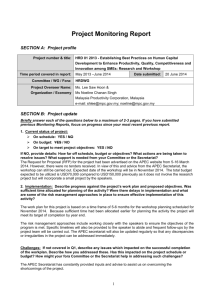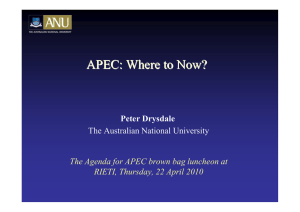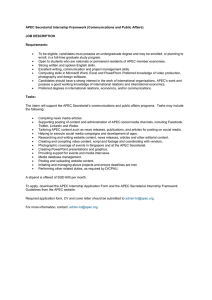Conclusions and Recommendations of APEC Peer
advertisement
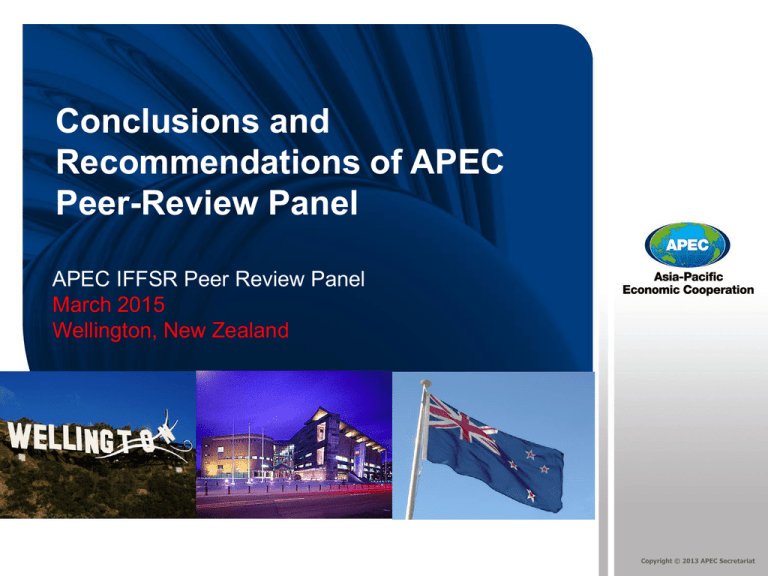
Conclusions and Recommendations of APEC Peer-Review Panel APEC IFFSR Peer Review Panel March 2015 Wellington, New Zealand Copyright © 2013 APEC Secretariat Toward a comprehensive review of subsidies Identifying all policies or measures that may provide some form of support is the first step in any review of subsidies: • Finding a commonly agreed definition of subsidies has proven a major challenge. • Identifying which specific fossil-fuel subsidies are ―”inefficient” and ―”encourage wasteful consumption” requires understanding the circumstances of each country, and the impact of the different subsidies in use. • Subsidies can take many forms either on the consumer or producer side. Copyright © 2013 APEC Secretariat The OECD concept of “support” Transfer Mechanism (how to transfer) Statutory or Formal Incidence (to whom and what a transfer is first given) Direct consumption Cost of Output returns Enterprise income intermediate Unit cost of Household or inputs enterprise consumption income Direct transfer of Unit subsidy funds Per-tonne subsidy Operating grant to Input subsidy for Subsidized lifeline electricity for electricity used in coalmining rate mining metallurgical coal company Transfer of risk to Price-triggered subsidy government Means-tested cold-weather grant Tax revenue foregone Excise-tax concession on fuel Other government revenue foregone Under-pricing of access to a natural resource harvested by final consumer Govt. limit on Govt. expenditure producer on coal buffer stock liability for mining accidents TTax deduction for energy Production tax purchases that credit for liquid exceed fuels from coal given share of income Reduced royalty payments on access to coal deposits Import tariff or Mandated Regulated price Induced transfers lifeline electricity export or cross subsidy rate subsidy on coal Reduced rate of income tax on coal-mining companies Costs of production factors Capital grant linked to acquisition of mining-related capital Credit guarantee linked to Security guarantee acquisition of for coal trains mining-related capital Reduction in excise Tax credit for tax on investment in fuel used for mining equipment mining Under-pricing of a good, govt service or access to a natural resource Monopoly Export restriction concession to coal on domestically company produced coal ANALYSIS OF THE SCOPE OF ENERGY SUBSIDIES AND SUGGESTIONS FOR THE G-20 INITIATIVE IEA, OPEC, OECD, WORLD BANK JOINT REPORT Under-pricing of access to govt. land used for storage of coal Wage controls on mining labour Copyright © 2013 APEC Secretariat The scope of the APEC peer-review of New Zealand On the basis of the OECD Inventory of measures supporting fossil fuels, New Zealand selected eight measures for consideration in the peer-review: • Non-resident off-shore drilling rig and seismic ship tax exemption • Three tax deductions for petroleum-mining expenditures • Petroleum tax and royalty regime • R&D funding for the oil industry • Financial restructuring of Solid Energy • Indemnity for mining land reclamation • Motor spirit excise duty refund • Funding of international treaty obligations to hold oil stocks Copyright © 2013 APEC Secretariat APEC Panel Peer-Review • This review focused on the eight measures that have been identified by the New Zealand Government. • The Peer Review Panel determined whether these instruments as implemented in New Zealand constituted inefficient subsidies that resulted in wasteful energy consumption. • This review follows the APEC guidelines for the peer review of fossil-fuel subsidies and used the template provided by the Secretariat (VPR/IFFSR). Copyright © 2013 APEC Secretariat Meetings conducted for the APEC peer-review • Ministry of Foreign Affairs and Trade (MFAT) • Ministry of Business, Innovation and Employment (MBIE) • Inland Revenue Department (IRD) • Treasury • Ministry of Transport • New Zealand Petroleum & Minerals (NZP&M) • Stakeholders from the private sector (PEPANZ) Copyright © 2013 APEC Secretariat Measures relating to the supply of hydrocarbons Of the eight measures selected by New Zealand, four relate directly to the supply of oil and natural gas: • Non-resident off-shore drilling rig and seismic ship tax exemption • Three tax provisions for petroleum-mining expenditures • Petroleum tax and royalty regime • R&D funding for the oil industry Copyright © 2013 APEC Secretariat Non-resident off-shore drilling rig and seismic ship tax exemption Initial observations: • The measure seems to help correct a distortion in the tax system that is caused by a special rule in New Zealand’s Double-Tax Agreements (DTAs); and, is consistent with New Zealand’s approach to taxation. • Tax provisions are designed to prevent ‘churning’ or cycling of equipment. • Fiscal impact is neutral or slightly positive. • The measure is reviewed every five years and does have currently an expiration date of 2019. Findings: • • By reducing the cycling of rigs and seismic ships, the measure avoids unnecessary costs, including additional fuel consumption, and the resulting greenhouse gas emissions. Continue to review provisions every five years based on activity with a lead-time of at least a year. Copyright © 2013 APEC Secretariat Tax deductions for petroleum-mining expenditures Initial observations: • The three measures for exploration and development expenditures are broadly consistent with New Zealand’s general tax practices across all sectors of its economy. • However, there is an asymmetry in the treatment of development expenditures since long-lived projects (> 7 years) can be amortised over a 7-year period rather than over the life of the asset. • These measures have no definite date of termination. Findings: • While these measures may serve to increase future production of fossil fuels, they are unlikely to affect consumption through lower oil prices since New Zealand is a price taker on world markets. • The measures may, however, increase energy security and reduce the country’s import bill. Copyright © 2013 APEC Secretariat Temporary reduction in royalty regime rate Initial observations: • This policy was introduced in response to a concern over the downward revision of reserves in the Maui gas field. • It applies only to fields discovered between 2004 and 2009 (two fields: Turangi and Kowhai). • Petroleum royalties are designed to capture the economic rent, or the super profit, from petroleum extraction; and, royalties are, by definition, over and above conventional taxation. • The government decided not to extend the measure after 2009 in light of its limited effects. Findings: • Prior to 2004, New Zealand already had among the lowest royalty rates (top 10 according to Ministry officials) but this was not enough to induce more oil and gas exploration. • Modelling by government agencies concluded that the royalty reduction had little to no effect on discoveries and created substantial tax revenue losses (> USD 70 million or > NZD 94 million). Copyright © 2013 APEC Secretariat R&D funding for the oil industry Initial observations: • The measure helps generate a basic understanding of New Zealand’s geology that is subsequently made publicly available. • Publicly available information fosters transparency and helps attract investment into the development of the country’s natural resources. • Information gained has been used for a wide range of other activities. • The measure is justified in terms of the public-good nature of geological information and data. • Currently, this measure is only funded until June 30, 2018. Findings: • If the data were to induce more fossil-fuel production in New Zealand, it would be unlikely to affect world market prices. • To the extent the geological data collected are a public good, then government intervention is justified. Copyright © 2013 APEC Secretariat Conclusions and recommendations for measures relating to O&G supply Conclusions • The four measures relating to the supply of oil and natural gas are not considered inefficient subsidies that encourage wasteful consumption of fossil fuels. • New Zealand is a small producer and a net importer. Increased production from New Zealand is therefore unlikely to affect prices on world markets and increase consumption. • These measures do help, however, to improve the country’s energy security, but only to a limited extent given the specifics of New Zealand’s resources (e.g. remoteness and geological conditions). Initial recommendations: • Review on a regular basis the effectiveness and usefulness of the various measures in terms of their impacts on exploration and production. Copyright © 2013 APEC Secretariat Measures relating to state-owned enterprises Of the eight measures selected by New Zealand, two involve assistance to state-owned Solid Energy: • Financial restructuring of Solid Energy • Indemnity for mining land rehabilitation Copyright © 2013 APEC Secretariat Government assistance to Solid Energy Initial observations: • The Government has already helped Solid Energy twice in the recent past alongside a commercial debt compromise between the company and its private sector lenders. • Several of the company’s mines are located on the West Coast of the South Island, which is a region with low economic activity and few employment opportunities. • At the time of the peer review, the company seemed to require coal prices of at least USD130 per tonne to be viable. Current prices are around USD 70 per tonne. • Power generators or other entities remain free to buy imported coal or domestic coal at market prices. Findings: • More data would be needed to evaluate the impacts on production costs but impacts on consumption are presumably low. Copyright © 2013 APEC Secretariat Indemnity for mining land rehabilitation Initial observations: • Solid Energy is required by various pieces of legislation controlling its mining activities to rehabilitate to an agreed condition the land on which its mining activities occur. • The NZ Government agreed to indemnify Solid Energy for the end of mine life rehabilitation costs (including water) relating to mining activities prior to September 30, 2014. It does not cover rehabilitation costs arising from mining activities carried out after that date. • The indemnity had an estimated present value of NZD103 million as of September, 2014 and improved the company’s balance sheet by that amount. Findings: • More data would be needed to evaluate the impacts on production costs but impacts on consumption are presumably low. Copyright © 2013 APEC Secretariat Conclusions and recommendations for measures relating to Solid Energy Conclusions • Government assistance to Solid Energy does not constitute an inefficient subsidy that encourages wasteful consumption. • Government assistance to improve Solid Energy’s balance sheet does not effect domestic coal prices to end-users. Initial recommendations: • Continue restructuring the company’s operations to reduce unit costs. • Otherwise, further assistance may divert resources away from more productive areas of the economy. Copyright © 2013 APEC Secretariat Measures relating to the consumption of fossil fuels Of the eight measures selected by New Zealand, two relate to the consumption of fossil fuels: • Motor spirit excise duty refund • Funding of international treaty obligations to hold oil stocks Copyright © 2013 APEC Secretariat Motor spirit excise duty refund Initial observations: • Excise-duty revenues are entirely earmarked for road construction and maintenance, i.e., a user’s tax for roads. • The refund focuses on off-road vehicles, mostly tractors and harvesters in the farming sector and commercial vessels. • Eligible users of fuel need to file an application. Findings: • • • • The measure is coherent within the broader context of the country’s motorfuel taxation, with user charges on on-road diesel-powered vehicles also earmarked for road construction and maintenance. Total revenues from the excise duty amount to about NZD 1.5 billion (USD 1.12 billion) while total refunds account for around 2-3%. There are instances of fraud in the registration of eligible vehicles, such as where non-farm vehicles (e.g. motorcycles, automobiles) benefit from the measure, but they are modest. Monitoring and better data may be needed to streamline refunds. Copyright © 2013 APEC Secretariat Conclusions and recommendations for the excise-duty refund Conclusion • • Considering the purpose and the magnitude of the refunds, this measure does not constitute an inefficient subsidy that encourages wasteful consumption. Over-all the excise-duty raises prices of motor fuels to the beneficiaries of expanded or well-maintained road infrastructure. Initial recommendations: • Better target the refunds by reviewing eligible vehicle types and fuels on a regular basis or placing a cap on each recipient. • Collect more data to enable an analysis of the impacts of fuel prices on the consumption of the agriculture sector and other off-road users. • Review on a regular basis: the effectiveness of the measure; and the broader question of tax rates and incentives for fuel efficiency (maybe as part of the revision of the GPS). Copyright © 2013 APEC Secretariat Funding of international treaty obligations to hold oil stocks Initial observations: • The Government is required to hold stocks for 90 days of net imports as part of its IEA treaty obligations. • This requirement is partially met using emergency ticket contracts for purchasing oil abroad at current market prices. • Tickets are now financed through higher levies on refined products (NZD 0.110 cents per litre or USD 0.082 per litre). Findings: • Meeting the IEA treaty obligation through ticket purchases appears a less expensive option than holding the stocks physically. • NZ commercial operators contribute to between half of the requirement to the entire requirement in some years. • The levies for financing tickets are akin to a user fee and raise the price of petroleum products to beneficiaries of oil security. Copyright © 2013 APEC Secretariat Conclusions and comments on the obligation to hold stocks Conclusions • This measure is not an inefficient subsidy that encourages wasteful consumption. • It results from a binding treaty obligation, which is now met through a user fee. • No clear impact on consumption could be identified. Additional comments: • Collective stockholding, even in the context of widely available supply, mitigates the potential market power of oil-producing countries, and does not constitute support of market prices. • Releasing stock during major international disruptions helps to moderate extreme oil price spikes. • Modifying the obligation is beyond the sole control of New Zealand, and would require negotiations with other IEA countries. Copyright © 2013 APEC Secretariat Overall conclusions • The Peer Review Panel did not identify any inefficient subsidies that encourage wasteful consumption in the eight measures selected by the New Zealand Government. • The Panel has, however, made a few recommendations that the New Zealand Government may wish to consider. • In particular, the New Zealand Government may wish to undertake periodic reviews of : • the incentives provided by the tax regime applicable to oil and gas exploration and production; • government assistance to Solid Energy; • the excise-tax system for motor spirits. Copyright © 2013 APEC Secretariat List of panel members and affiliations • Dr. Lorna Greening, Research Fellow, Howard Baker Center for Public Policy, University of Tennessee, United States • Han Wenke, Professor of Energy Research Institute, NDRC, China • Baltazar, Luningning G., Division Chief, Power Market Development Division, Department of Energy, Philippines • Dr. Ruengsak Thitiratsakul, Deputy Director, Petroleum Institute of Thailand • Dr. Rofyanto Kurniawan, Director for Center of Budget Policy, Fiscal Policy Agency, Ministry of Finance the Republic of Indonesia • Jehan Sauvage, Organisation for Economic Co-operation and Development • An Qi, Research Associate of Energy Research Institute, NDRC, China Copyright © 2013 APEC Secretariat
